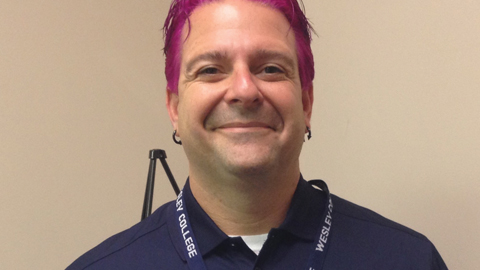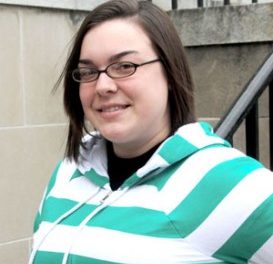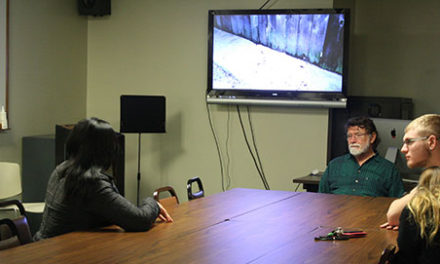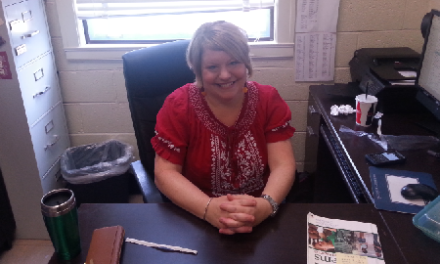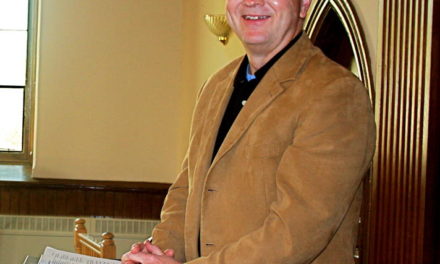By Brittany Wilson, The Whetstone
Pastor Scot McClymont played the drums in his first band when he was 14—their gig at the bar made him his first hundred bucks. Little did he know, 15 years later he would be spending nearly 18 times that much—weekly—to sustain his drug and alcohol addictions.
“I grew up in the church,†he said. “But from the time I was 12 to the time I was 30 I really subscribed to the whole ‘sex, drugs, and rock and roll’ way of life. I steered clear of the church for a lot of years.â€
Thirty years after that first night at the bar, McClymont’s look is a morph between rock star and comic book nerd—with tattoos on his forearms, black hoops in his ears, and a spiky shade of pinkish-purple in his hair resembling the razzle dazzle rose crayon in Crayola’s 64-pack—a flaming contrast to the neutral walls that box him in his small office.
McClymont, the director of youth and young adult ministries for Peninsula Delaware’s United Methodist Conference, was recently introduced as Wesley College’s new campus chaplain.
He perched himself on a four-legged stool in front of his desk, rather than retreating behind it, to talk about his life. He pointed out a sign that reads, “The Chaplain is in,†propped up in the corner of his office.
“I kind of just hang out on campus, set that sign up at a lunch table or the Starbucks, and if someone wants to they can sit down and talk,†he said. “I’m not on campus to evangelize. We can talk about things no matter what you believe. I have a heart and a passion for working with young people—I don’t want anyone to make the mistakes I made.â€
When McClymont was ten years old he felt he was being called into Christian ministry, just like his grandfather. “I knew I was supposed to be a pastor,†he said.
Later that year when his grandfather died suddenly, McClymont was devastated.
“I had a lot of anger and resentment toward God like, ‘How could you take my grandfather away?’†he said. “So I rebelled.â€
McClymont was born and raised in Baltimore until his family moved to Salisbury, Md., when he was five years old. His family lived with his grandparents until they were finally able to acquire a house of their own.
“I don’t think I’ll ever get over losing him,†he said. “But I don’t know that I ever should. Like Batman—he’s still never gotten over his parents’ death.â€
Batman is more than just a passing reference for McClymont.
“Batman has always intrigued me,†he said. “I think I connected with Batman because of death at an early age and we both had interesting ways of dealing with it. His was this crime thing, he goes out and acts against it with a vengeance, and I was acting out against God. I didn’t know how to handle grief and death and loss, so I masked all of that under this rock and roll party guy for 18 years.â€
McClymont said the whole decade of the Nineties is a blur, but in that time he met and married his wife Dawn, moved twice in Delaware – Wilmington and then Clayton – and became a father; all the while still far from the church.
On Sept. 10, 2001, McClymont said he was invited to attend a new church service in Smyrna.
“I jokingly hung up the phone,†he said. “There was no way I was going to church.â€
The next morning, he woke up to the news about the first plane hitting the World Trade Center.
“All of my mom’s family is from New York, so we have a lot of ties to Manhattan,†he said. “My cousin worked in those towers. That really hit me.â€
He decided to give church another chance.
By this time, McClymont said he was an addict, spending nearly $1,800 a week on drugs and alcohol.
“I maybe had another week or another month,†he said. “At the rate that I was going, I couldn’t have survived much longer.â€
A month later, the pastor gave a sermon on tithing.
“At the end of it the pastor said, ‘so after everything that I’ve said in the sermon, I want you to know that God doesn’t want your money. The perfect picture to God would be to strip everything else and put yourself in the offering plate.’ So I did.â€
After that day, McClymont said he did not spend another penny on his addictions.
“If death was the thing I was angry about, I guess I really didn’t want to die,†he said. “I finally came to the realization, after so many years, that if my grandfather had truly fallen in love with the life that God offered, why was I so busy suffering in the midst of death? I wanted to live again.â€
It was a healing process, McClymont said. Up until 2001, McClymont was an absent father and a distant husband. Over the course of his addiction, he had lost contact with his parents and his brother. McClymont said after a lot of tears and forgiveness, he became more involved with his family.
“The problem with hitting the bottom is, once you get there it’s hard to tell which way is up,†he said. “You’re looking for something, some kind of promise or some hope, because everything around you just feels like darkness. When I saw that glimmer of light I grabbed onto it. I knew there was something to this life.â€
He glanced down at his feet as they dangled back and forth from where he sat, the black and white checkered slip-ons swaying like a checkered flag at the end of a race, the finish line.
McClymont said God seemed to move everything very quickly.
In 2003, he was hired as the youth director at Asbury (United Methodist Church) UMC; in 2004, his youngest son was born, and in 2005, he was appointed pastor of Kenton UMC, where during the eight years he served, the church’s congregation grew from 14 to 300. For the last two years, he has worked as a youth and young adult resource to the 422 Methodist churches on the peninsula.
Wesley student Samuel Frain said he was surprised by McClymont’s appearance at first, but is excited to see what kind of difference he will make on campus.
“I would love to see Pastor Scot involved with the different on campus ministries like IMPACT and Fellowship of Christian Athletes,†he said. “It would also be great to get community service events together as well as on campus meetings with those who might be interested.â€
McClymont said his job is to be ecumenical.
“Just because someone is Muslim or Jewish does not mean they can’t talk to me and we can’t still discuss faith issues,†he said. “Those who think they are void of faith, say they are atheists, or agnostic, or questioning—we can have conversations about those things.â€
The chaplain position is a part-time, one year commitment. McClymont is available by appointment at his office or on Tuesdays and Thursdays while he is on campus.
“I’m not always prepared,†he said. “I don’t always have the right answers. I don’t know all the theology. It would take me several life times to learn everything and know exactly what to say. But I never quit. I never give up.â€
Just like Batman.
“He’s not super,†McClymont said, referring to the caped crusader. “He doesn’t actually have a super power, but he’s considered a hero.â€

